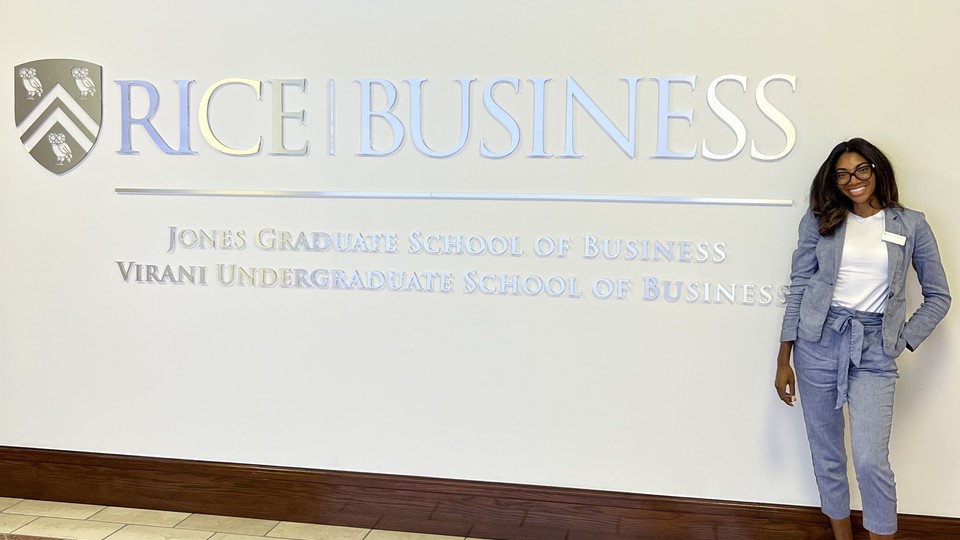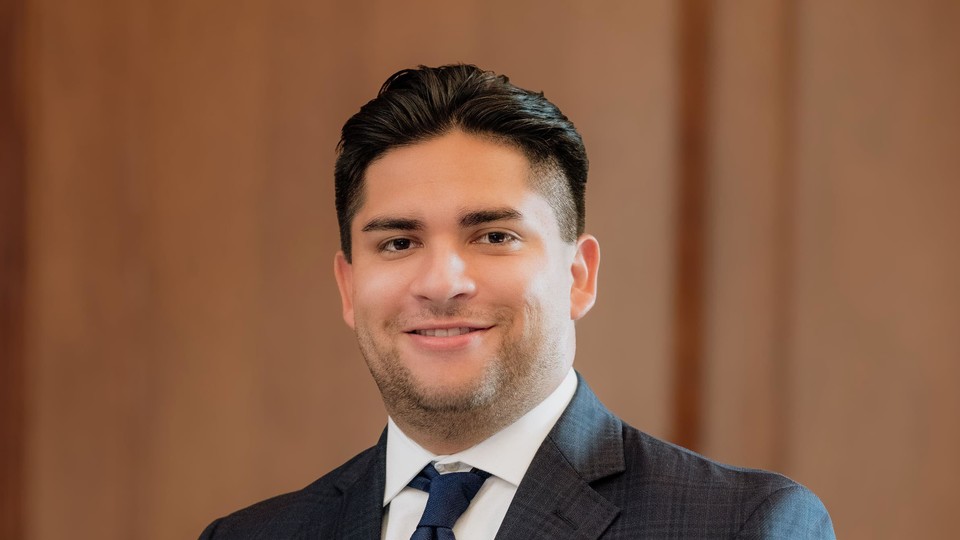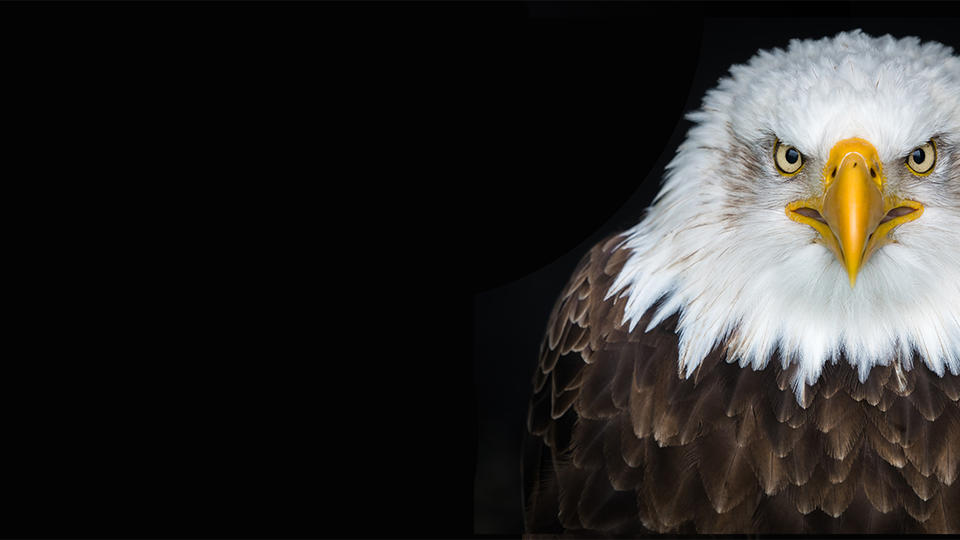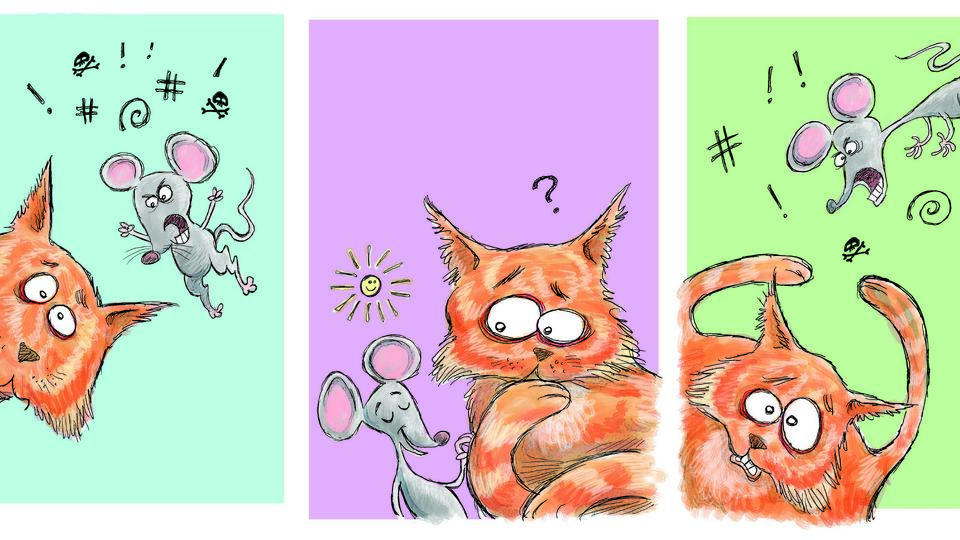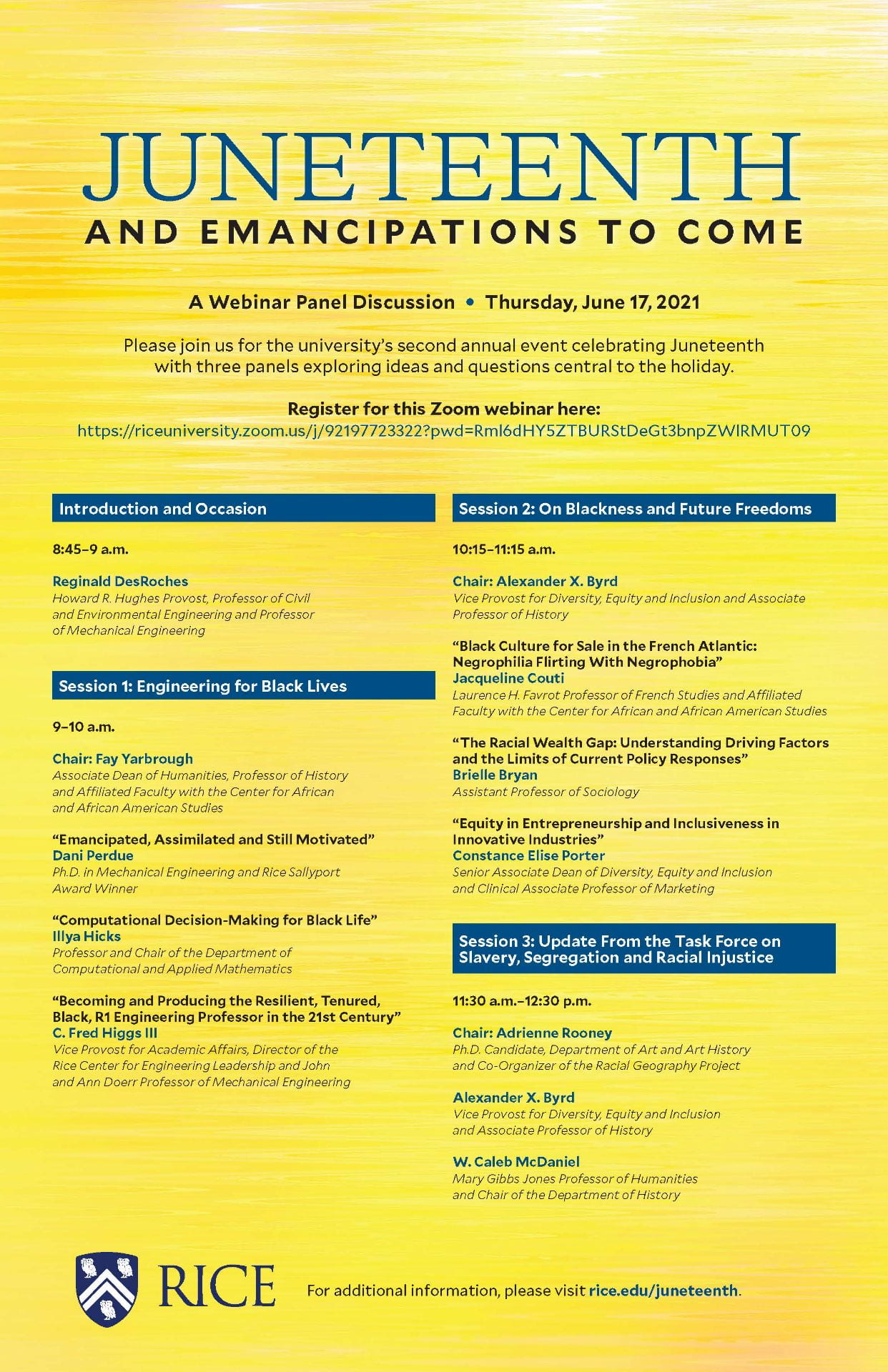
Rice celebrates Juneteenth and emancipations to come
Rice’s second annual Juneteenth celebration will bring together professors across the university — including Rice Business professor Connie Porter — for three panels exploring ideas and questions central to the meaning and promise of the important holiday.
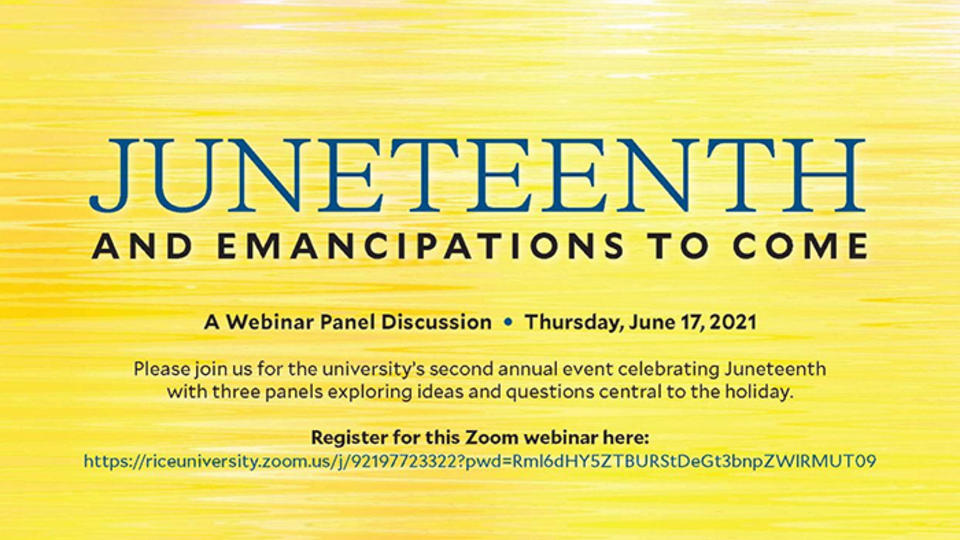
June 17 event will explore Blackness and future freedoms
Rice’s second annual Juneteenth celebration will bring together professors across the university — from Computational and Applied Mathematics to Modern and Classical Literature and Cultures — for three panels exploring ideas and questions central to the meaning and promise of the important holiday.
“Juneteenth and Emancipations to Come” will take place June 17 via Zoom, with an introduction at 8:45 a.m. from Reginald DesRoches, the Howard R. Hughes Provost and professor of civil and environmental engineering and of mechanical engineering. The event will close at 11:30 a.m. with an update from Rice’s Task Force on Slavery, Segregation and Racial Injustice.

“Juneteenth is a time to reflect on our past and explore how we want to move forward in the future,” DesRoches said. “I believe the university has organized a lecture series that will provide that opportunity to anyone who wants to participate.”
Two additional hourlong sessions will feature presentations from faculty and one recent alum: Dani Perdue ’21. The newly minted mechanical engineering Ph.D. will kick off the first session, “Engineering for Black Lives,” with her talk: “Emancipated, Assimilated and Still Motivated.”
Rice’s most recent Sallyport Award winner and a National GEM Consortium Fellow, Perdue once personally recruited six Black students to Rice during a National Society of Black Engineers national convention. During her time as a graduate student, Perdue founded the Mechanical Engineering Graduate Student Association (GSA) and served as the president of the Black GSA as well as the Graduate Student Association’s first vice president of equity and inclusion.
The 9 a.m. “Engineering for Black Lives” panel will also feature Illya Hicks, professor and chair of the Department of Computational and Applied Mathematics (CAM), who will discuss “Computational Decision Making for Black Life.” C. Fred Higgs III, vice provost for academic affairs, director of the Rice Center for Engineering Leadership and the John and Ann Doerr Professor of Mechanical Engineering, will talk about “Becoming and Producing the Resilient, Tenured, Black R1 Engineering Professor in the 21st Century.”
Fay Yarbrough, associate dean of humanities, professor of history and founding faculty for Rice’s Center for African and African American Studies (CAAAS) will chair the 9 a.m. “Engineering for Black Lives” session.
The 11:15 a.m. panel “On Blackness and Future Freedoms” begins with a talk from Jacqueline Couti, the Laurence H. Favrot Professor of French Studies and founding faculty for Rice’s Center for African and African American Studies, on “Black Culture for Sale in the French Atlantic: Negrophilia Flirting with Negrophobia.”
Assistant professor of sociology Brielle Bryan will speak to “The Racial Wealth Gap: Understanding Driving Factors and the Limits of Current Policy,” and Constance Elise Porter, senior associate dean of diversity, equity and inclusion and clinical assistant professor of marketing in the Jones Graduate School of Business, will discuss “Equity in Entrepreneurship and Inclusiveness in Innovative Industries.”
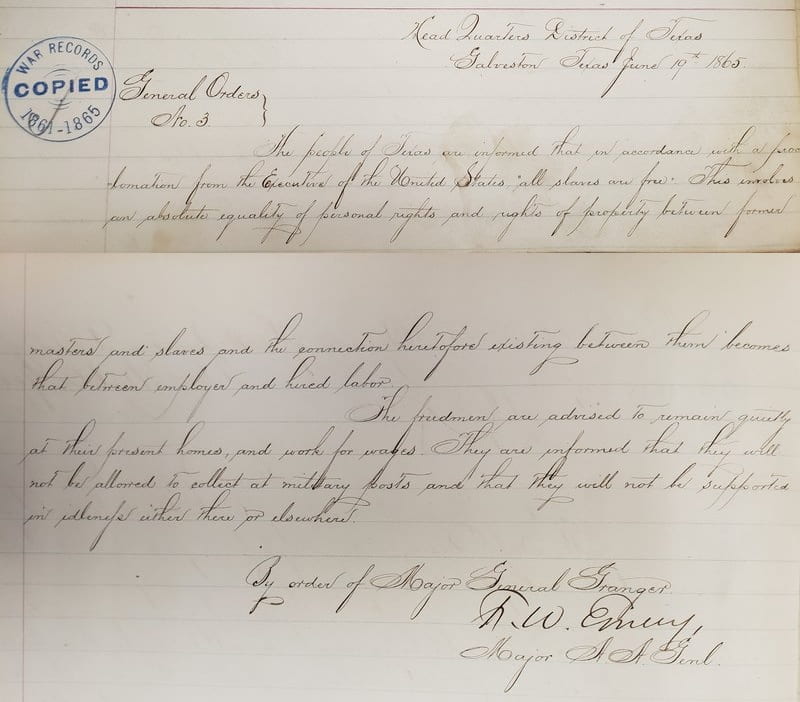
Alexander Byrd, vice provost for diversity, equity and inclusion and associate professor of history, will chair the 11:15 a.m. session “On Blackness and Future Freedoms.”
Along with Caleb McDaniel, the Mary Gibbs Jones Professor of Humanities and chair of the Department of History, Byrd will also close the event with an update from the task force, which has posted much of its ongoing work online in the form of webinars and podcast episodes.
Graduate student Adrienne Rooney, a Ph.D. candidate in the Department of Art History and a co-organizer of Rice’s Racial Geography Project, will chair the final panel.
Now celebrated nationwide, Juneteenth is of particular prominence for Texans. The holiday originated in Galveston and marks the anniversary of General Order No. 3 issued on June 19, 1865, which proclaimed the end of slavery in Texas and the official emancipation of its enslaved people. The original version was unearthed in the United States National Archives just last year.
Juneteenth is also directly responsible for the creation of the first public park in Texas: Houston’s Emancipation Park, which was established in 1872 for the sole purpose of hosting Juneteenth celebrations. After Emancipation Park was donated to the city in 1914, it remained an important public space for the Black community — and a new recreation center, public pool and bathhouse were designed for the park by none other than William Ward Watkin, founder of Rice’s architecture school. This year, the park will host its 149th annual Juneteenth celebration.
The lectures from Rice’s inaugural celebration of the holiday, “Reflections on Juneteenth and America’s Racial Legacy,” were archived by Fondren Library and are now available to view online.
“Juneteenth and Emancipations to Come,” June 17, 8:45 a.m.-12:30 p.m., online. Free. Registration required.
You May Also Like

Rice University’s Jesse H. Jones Graduate School of Business today announced the launch of its Graduate Certificate in Healthcare Management program, a 10-month, credit-bearing professional credential designed for current and aspiring leaders seeking deep expertise in the business of healthcare.
Rice University researcher reveals the benefits to unauthorized manufacturing markets
Rice Business Professor Amit Pazgal found that in certain situations, gray markets can actually help manufacturers and retailers.

Executives aren’t sold on strategy planning, research finds
New research co-authored by Rice Business professor Vikas Mittal shows executives doubt the effectiveness of strategy planning, which is conducted by an overwhelming majority of large companies in the United States. That attitude may doom such plans’ successful implementation, the researchers argue.


New research shows executives doubt the effectiveness of strategy planning, which is conducted by an overwhelming majority of large companies in the United States. That attitude may doom such plans’ successful implementation, the researchers argue.
Executives at 88% of large companies engage in strategy planning, according to the research featured in a chapter of “Focus: How to Plan Strategy and Improve Execution to Achieve Growth,” a new book co-authored by Vikas Mittal, professor of marketing at Rice’s Jones Graduate School of Business, and Shrihari Sridhar, professor of marketing at Texas A&M University’s Mays Business School.
In 1973, when Louis Gerstner, former CEO of IBM, sought fellow chief executives’ reactions on this topic for an article for McKinsey Quarterly, they responded that strategic planning is “basically just a plaything of staff” and “a staggering waste of time.”
Today, executives’ attitudes toward strategy planning are just as skeptical, according to three recent studies reported in the book.
The first study captured a national sample of 5,433 full-time employees with 668 senior executives including CEOs/presidents, senior/executive vice presidents or vice presidents. Among senior executives, 43% agreed or completely agreed they were doubted the effectiveness of their company’s strategy plans.
In the second survey, of 57 executive MBAs, 25% agreed or strongly agreed they were “quite skeptical of their company’s strategic plan.” The third study of 23 executives in the energy industry, found 39% were “quite skeptical of their company’s strategic plan.”
“The skepticism about strategy planning appears to be a widely known but carefully guarded secret among corporate executives,” Mittal said. “With 2 out of 5 executives doubtful about strategy planning, the amount of time and effort being spent on strategy planning activities by companies such as Shell and ExxonMobil is puzzling. It could be that executives wildly overestimate the financial benefits of strategy planning but underestimate the level of skepticism everyone around them has in the strategy plan.
“If senior executives, middle managers and front-line employees doubt a company’s strategic plan, how can its implementation be successful? When people are doubtful about a strategy’s effectiveness, they lower their commitment to implementing it.”
“In many cases, senior executives think of strategy planning like an amateur stock picker thinks of stock-market investing. Both will selectively remember the few times when actions based on their hunches or gut feel succeeded, ignoring failures.”
Increasing confidence in a company’s strategic plan is not a simple matter of communicating it, Mittal said. “It requires executives to have humility and acknowledge that their hunches, gut feelings and judgment are more fallible than a strategy plan based on analytics using statistical analysis, machine learning algorithms and randomized experiments to establish true causality,” he said. “These techniques are used in basic corporate functions such as product development and testing, and strategy planning should have to stand the same test of rigor.”
You May Also Like

Rice University’s Jesse H. Jones Graduate School of Business today announced the launch of its Graduate Certificate in Healthcare Management program, a 10-month, credit-bearing professional credential designed for current and aspiring leaders seeking deep expertise in the business of healthcare.
Talking Technology in the Energy Industry feat. Tamara Hughes ’16
Season 1, Episode 21
This episode is part of a set of short interviews which were recorded during Alumni Reunion Week 2021. Be sure to listen to the other two Alumni Reunion Week episodes. Tamara Hughes ’16 joins host David Droogleever in the Owl's Nest.
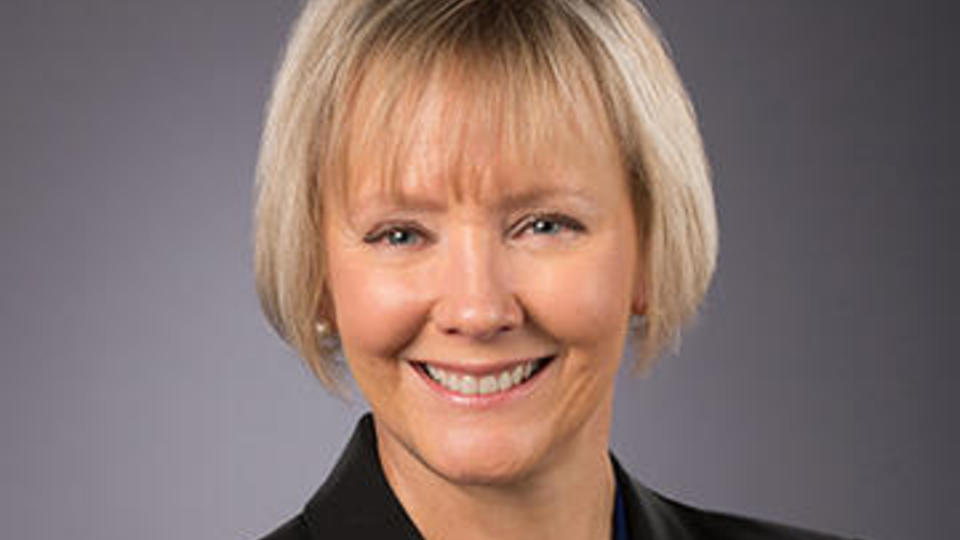
Owl Have You Know
Season 1, Episode 21
This episode is part of a set of short interviews which were recorded during Alumni Reunion Week 2021. Be sure to listen to the other two Alumni Reunion Week episodes. Tamara Hughes '16 joins host David Droogleever in the Owl's Nest.
Subscribe to Owl Have You Know on Apple Podcasts, Spotify, Youtube or wherever you find your favorite podcasts.
You May Also Like
Student Feature: Tohfe Beidas


Meet Tohfe Beidas, Professional MBA Class of 2022, who was featured in Metro MBA's Real Human features.
Hometown
Houston, Texas
Undergraduate Institution and Major
University of Houston
- Major: Supply Chain Management & Marketing
- Minor: International Area Studies in Asia
Pre-MBA Work Experience
I have been working in supply chain/operations in the chemical industry for the past five years at LyondellBasell. However, I have shifted towards talent management (still supporting supply chain) at the same company in the past year.
Why business school? Why now?
Ever since I graduated in 2015, I always knew I wanted to pursue my MBA to continue my growth and learning. A mentor had told me “the longer you wait, the more valuable the MBA is.” At the time, I didn’t fully comprehend the importance of that advice but now it fully makes sense! I waited about five years before deciding to go back to school. With having multiple years of experience under my belt, I am able to better understand the coursework and contribute more effectively in the classroom. Timing is different for everyone, but, for me, the current timing was right. Although 2020 was a whirlwind, I thought what better time than now to get this started.
Why did you pick your school/program? What factors figured most prominently into your decision of where to attend?
I was born and raised in Houston and knew I wanted to stay local to be able to continue working throughout my MBA. Rice has always been on my radar, but once I started digging into the different offerings, I realized that this was the best choice for me. I was interested in a program that had a full campus. I also wanted to have flexibility with the courses in my second year, which Rice has a wide variety of electives to choose from. I was looking for a school that had student organizations and other extracurricular activities that align with my interests. I knew I wanted to be academically challenged and to be surrounded by such bright individuals. Diversity, equity and inclusion was also extremely important to be, and I was fortunate to attend Rice at a time where these initiatives have grown immensely. Throughout the recruiting process, I heard the phrase “You Belong Here” multiple times. I instantly felt welcomed from the very first interactions that I had with the Rice community. Just like choosing a company whose values and culture interest you, you should have the same mindset when choosing a school.
What do you think is your most valuable or differentiating contribution to your graduating class?
Each student brings something unique to the table and to our class, which makes it so interesting to learn about each person’s experiences and background. I believe that I bring a unique, diverse perspective, leadership experience, and knowledge. I have a passion of volunteering and giving back, and am dedicated to furthering growth and development. Nonetheless, I truly appreciate the cohesiveness despite the uniqueness of each individual.
Fun fact that didn’t get included on your application?
During the pandemic, I spent a lot of time in the kitchen baking and cooking exploring new recipes and cuisines. However, I specifically found my love for baking traditional Arabic desserts, it sparked an idea and I think I can turn into a small business one day! Here’s another fact: when I was a senior in High School in around 2009-2010, we had to write our final research paper and were required to pull resources from the Fondren Library at Rice. That was actually the last time I stepped foot on campus until my first day of class of my MBA, it almost felt like a full circle with my education. I was familiar with the area around the campus, but I had forgotten how beautiful the campus itself was.
Advice to current prospective applicants
- Take time to figure out your story and how all of your experiences will bring value to your application. Every portion should all relate back to the story. There should be a consistent theme throughout the application and naturally, the opportunities you take advantage of during your MBA will also relate back to the theme.
- Do your research and figure out what you want to take advantage of when you start your MBA before you start. When you start, you will have SO many things to keep up with. If you define this early, it will allow you take advantage of those opportunities in a timely manner to maximize your experiences during your few years at your school.
- Once you have determined what you’d like to do, take advantage of the variety of opportunities that the school has to offer. Whether it be student organizations, electives, volunteering opportunities, internships, extracurricular programs, mentorship opportunities or whatever the case may be – each program will help you on your personal growth journey and will help shape your MBA experience.
- Trust the process and the journey that you are setting on. You will come across bumps in the road, but you will be where you are meant to be.
- Lastly, enjoy the ride and have fun! It can get extremely busy, but you and your classmates are in it together and you will look back and cherish the moments that you shared with others during the experience.
What is your initial impression of the school’s students/culture/community?
Starting an MBA in the midst of a global pandemic is quite a unique experience, but I was able to experience the Rice culture early on. They quickly adapted to virtual learning to allow a safe environment for us to continue with in-person classes. Seeing various other universities in Houston remain online, we were very fortunate to have the opportunity to continue the learning in a somewhat “normal” environment given the situation with COVID-19. However, we are excited that the conditions are improving so we can engage in more in-person activities with much lighter restrictions for our second year. Even with the restrictions, our class has been fortunate to build great connections and friendships. With that being said, it has been a wonderful experience, and I am thankful to be a Rice Owl!
Tohfe Beidas is a Professional MBA student in the Class of 2022.
The Rice MBA
Student Feature: Keri Sprung
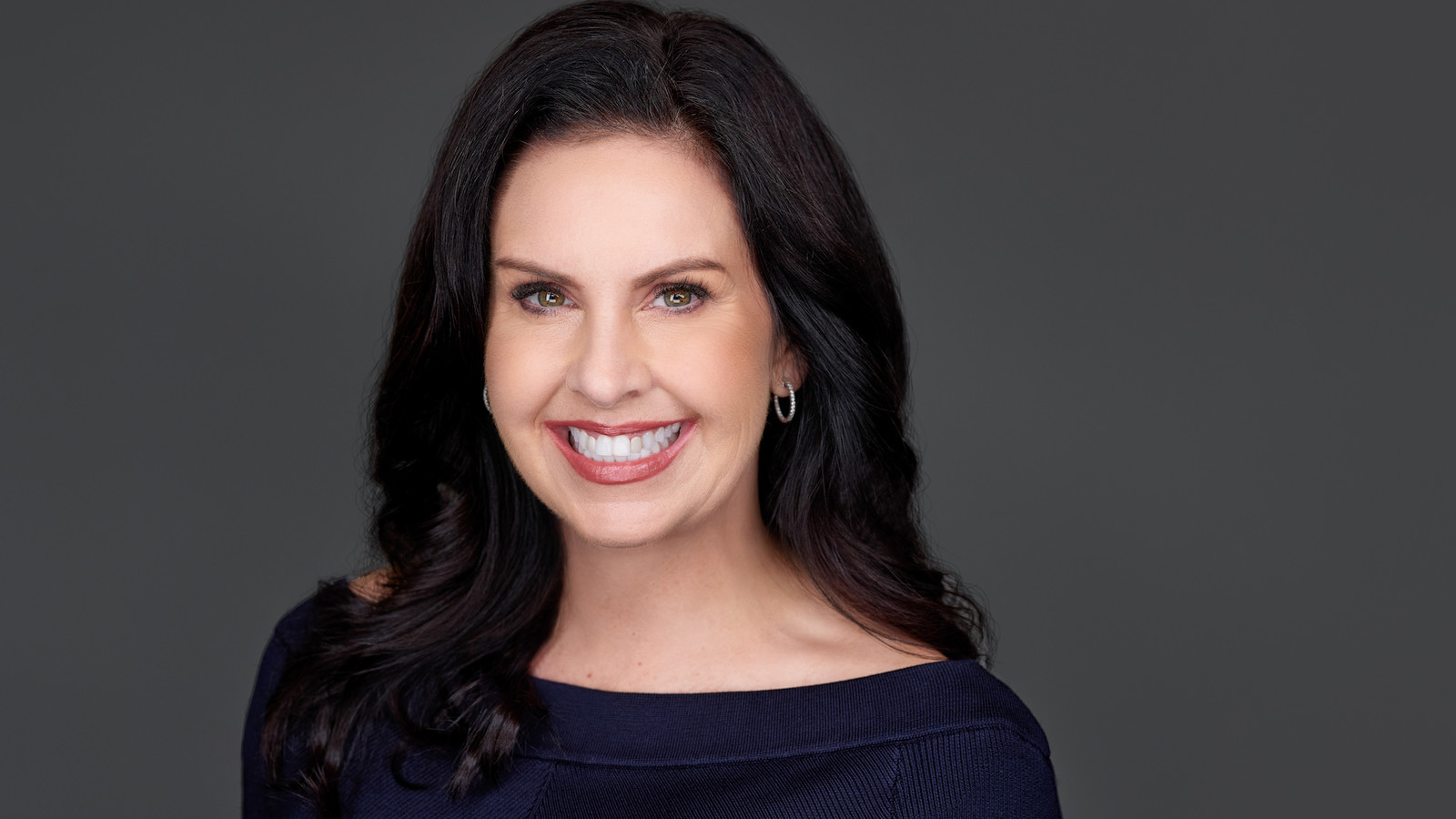
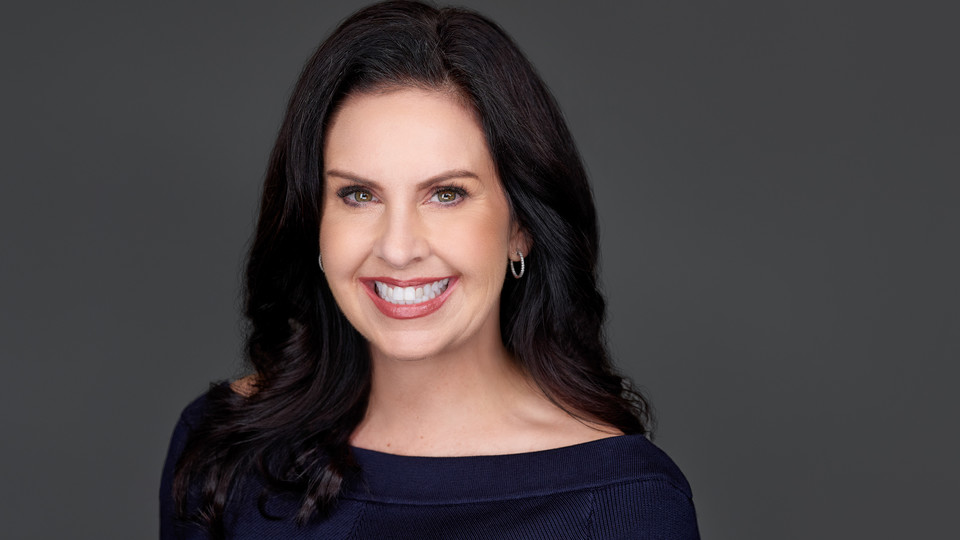
Meet Keri Sprung, Executive MBA Class of 2022, who was featured in Metro MBA's Real Human features.
Hometown
The Woodlands, Texas
Undergraduate Institution and Major
University of Texas at Austin, BA Biology
Pre-MBA Work Experience
I have 25 years of work experience primarily in medical research and innovation for-profit and non-profit sectors. After graduating from the University of Texas at Austin’s College of Natural Sciences, I worked for Pfizer Pharmaceuticals, Inc. across several Texas Medical Center healthcare institutions. I served as vice president of marketing for an Austin-based biotech firm. I later co-founded two medical device companies that provided surgical services to hospital systems across the southwest region. Since 2012, I have worked at the Texas Heart Institute in the Texas Medical Center and volunteered with several non-profit advocacy organizations, including the American Heart Association, Texans for Stem Cell Research, Breakthrough Houston, Genetics Policy Institute, and Elnita McClain Women’s Center. I currently serve as a Rice Business Board Fellow for Children at Risk.
Why business school? Why now?
I have 25 years of work experience primarily in medical research and innovation for-profit and non-profit sectors. After graduating from the University of Texas at Austin’s College of Natural Sciences, I worked for Pfizer Pharmaceuticals, Inc. across several Texas Medical Center healthcare institutions. I served as vice president of marketing for an Austin-based biotech firm. I later co-founded two medical device companies that provided surgical services to hospital systems across the southwest region. Since 2012, I have worked at the Texas Heart Institute in the Texas Medical Center and volunteered with several non-profit advocacy organizations, including the American Heart Association, Texans for Stem Cell Research, Breakthrough Houston, Genetics Policy Institute, and Elnita McClain Women’s Center. I currently serve as a Rice Business Board Fellow for Children at Risk.
Why did you pick your school/program? What factors figured most prominently into your decision of where to attend?
Adding value to my institution, family, and community – both personally and professionally – was my primary goal when choosing an MBA program. I chose Rice Business because I wanted not only to complete a rigorous curriculum but engage with a diverse and progressive alumni community after graduation to expand my network for professional, philanthropic and personal goals.
What do you think is your most valuable or differentiating contribution to your graduating class?
We started our program during a global pandemic on Zoom — not exactly conducive to building relationships with your classmates. I knew that networking was one of the significant reasons many executives seek an MBA, so I decided to be brave and reach out personally to connect with as many of my classmates as possible in the first few weeks. Our cohort of 63 brilliant professionals is exceptionally close today, and I am honored to be in this program with every one of them.
Fun fact that didn’t get included on your application?
In 2015, I recognized the need to submerge myself into a rigorous graduate program and decided to take a few courses at the Rice Glasscock Center for Philanthropy and Nonprofit Leadership. I was concerned that my ability to inspire others would soon hit a plateau if I did not seek formal training. I took 4 or 5 courses at night, and they were enlightening. Taking these continued learning courses solidified my decision to apply to the Rice MBA program.
Post-MBA career interests?
My goal is to continue to advance my career in the non-profit sector and engage in additional opportunities with entrepreneurial individuals, companies and institutions in the future that are pursuing impactful business ideas that will benefit from my breadth of experience and new knowledge.
Advice to current prospective applicants
When evaluating the commitment, don’t be apprehensive about the time commitment. If you sit down and assess a 22-month program and break it down into weeks, it does not look so daunting. It is always possible to find time in your schedule. With solid scheduling discipline and support from your family, friends and co-workers the program is entirely manageable — and exhilarating.
What is your initial impression of the school’s students/culture/community?
Inspiring and engaging with boundless optimism.
Keri Sprung is an Executive MBA student in the Class of 2022.
The Rice MBA
27 MBAs With the Highest Return for Grads Earning $100,000-Plus
MBA grads from these business schools have at least a 160% average return, U.S. News data shows.

Student Feature: Chelsea Rose
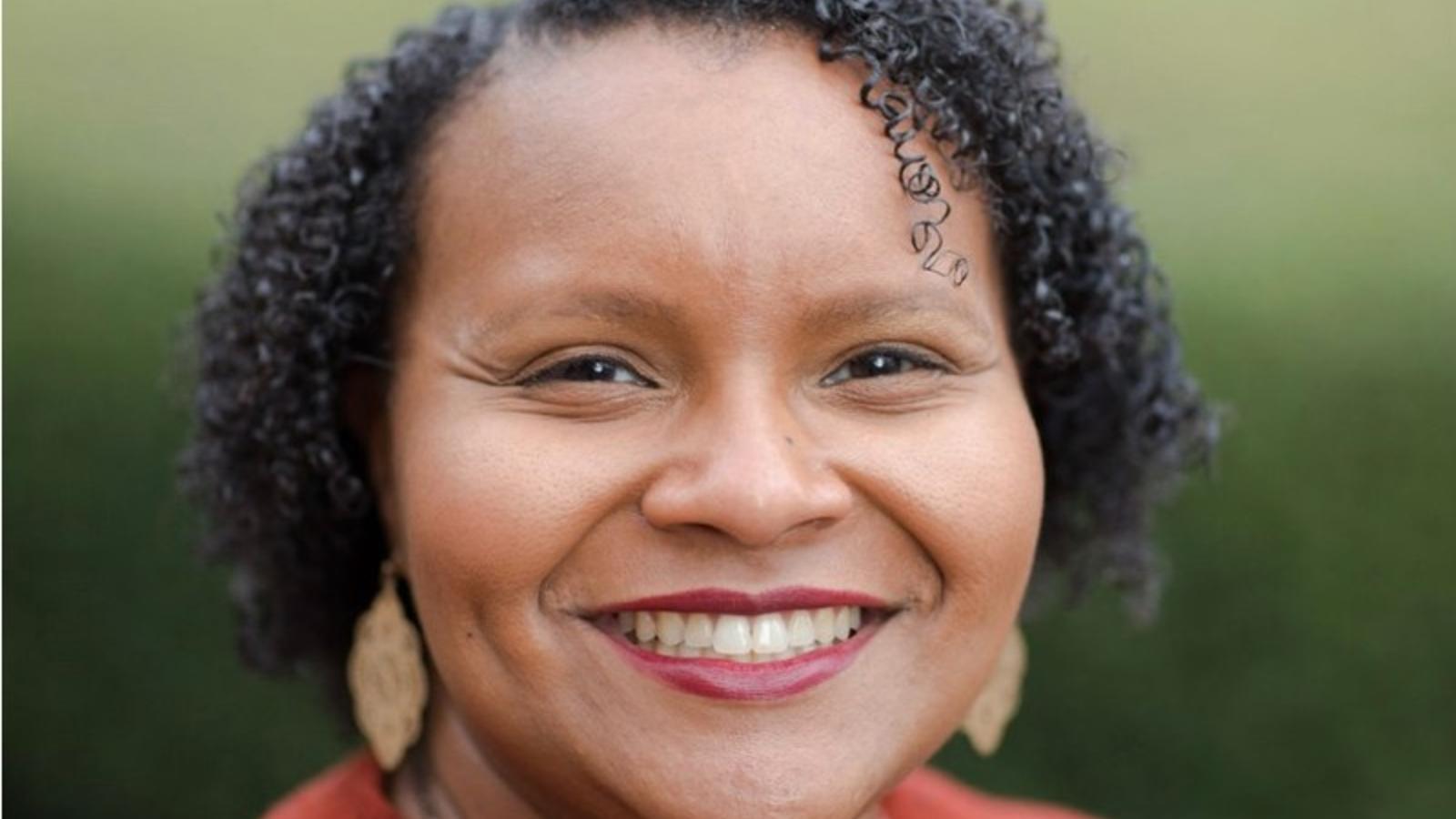
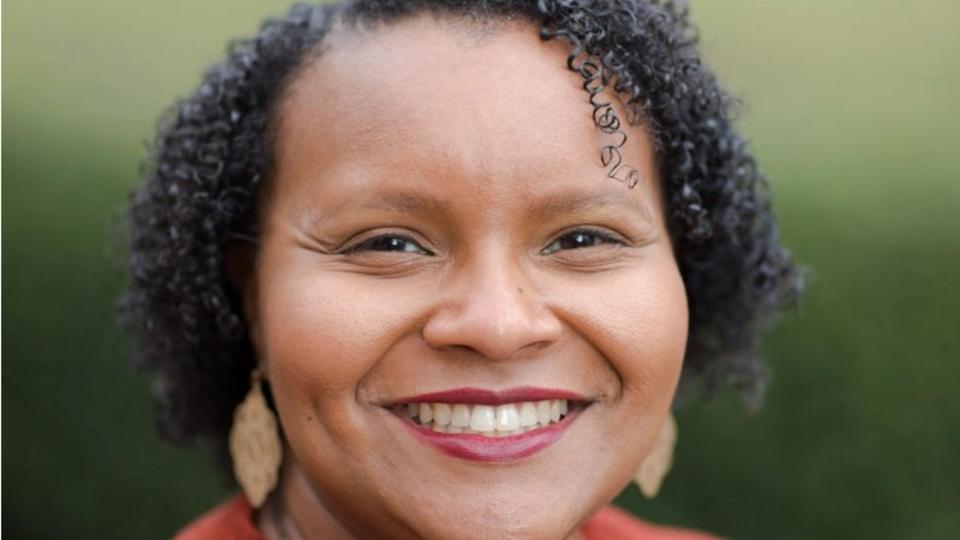
Meet Chelsea Rose, Professional MBA Class of 2022, who was featured in Metro MBA's Real Human features.
Hometown
Missouri City, Texas
Undergraduate Institution and Major
The Ohio State University, Sociology
Pre-MBA Work Experience
- Education, Teacher (5 years)
- Coach/Non-profit Professionals (4 years)
Why business school? Why now?
One of my long-term goals is to reimagine the way that we, as a society, experience the workplace. In my time as an educator, I’ve noticed that negative workplace dynamics can be huge barriers in achieving the level of success and impact that we’d like to have. Turnover, unproductive interpersonal conflict, and poor communication skills are just some of the common barriers that I have experienced. Right now, amidst a global pandemic and social unrest, it’s even more important that our business leaders are aware of workplace dynamics and work to actively change systems and structures that allow employees to be fully human. In order to change these systems, one needs a deep historical knowledge of how these systems were created and what forces continue to perpetuate them. I seek to create change at multiple levels and achieve impact in the long-term.
Why did you pick your school/program? What factors figured most prominently into your decision of where to attend?
I chose Rice Business because of its commitment to diversity and inclusion. It was important to me that I learn both from and with people who think differently than I do, and as a result I have gained new perspectives. I had the opportunity to join the Diversity, Equity and Inclusion (DEI) council for the Jones Student Association for Professionals (JSAP), and learned about how difficult it can be to both bring people along with you on the DEI journey as well as create a strong and compelling map for the journey. I gained insight about what students felt needed to change in regards to DEI at Jones and hope to continue moving this work forward as I start my second year.
What do you think is your most valuable or differentiating contribution to your graduating class?
During class, I make it a point to “run back” more of the complex topics that are discussed. This check for understanding (as we know it in education) helps me to solidify the learning, cement it in my brain, and build conceptual understanding of some of the more complicated topics that are covered. While in class, it’s very easy to not want to participate because you may feel like the question you have is a dumb question, but every dumb question I’ve had someone else has also had, and I’m happy to be the one to ask those questions.
Fun fact that didn’t get included on your application?
I have run 9 half marathons and 1 full marathon.
Post-MBA career interests?
I’m interested in pursuing a career in consulting. I’m lucky enough to have the opportunity to intern at Accenture Strategy this summer and am looking forward to learning and growing as a strategic thinker and problem solver.
Advice to current prospective applicants
This sounds really corny, but be yourself. Others can tell when you’re not being authentic and it’s hard to continue with a façade. In essays and interviews, be honest and tell your story in a way that’s compelling and allows people to really get to know you. At the end of the day we’re all people ultimately wanting to connect with other like-minded people.
What is your initial impression of the school’s students/culture/community?
I have really enjoyed my time at Rice Business. I have built some really great relationships with my classmates and view them as some of the smartest people I have ever and probably will ever know. Starting business school in the heart of a global pandemic has been really tough, but I can say with confidence that Rice Business tries its very best to ensure that students feel connected and part of a community by allowing us to come on campus and hosting events so that we can continue to build that community.
Chelsea Rose is a Professional MBA student in the Class of 2022.
The Rice MBA
Student Feature: Julianne Katz
At Rice Business, our clubs, organizations and conferences give students the opportunity to cultivate their leadership and business skills and to network with experts in different industries.
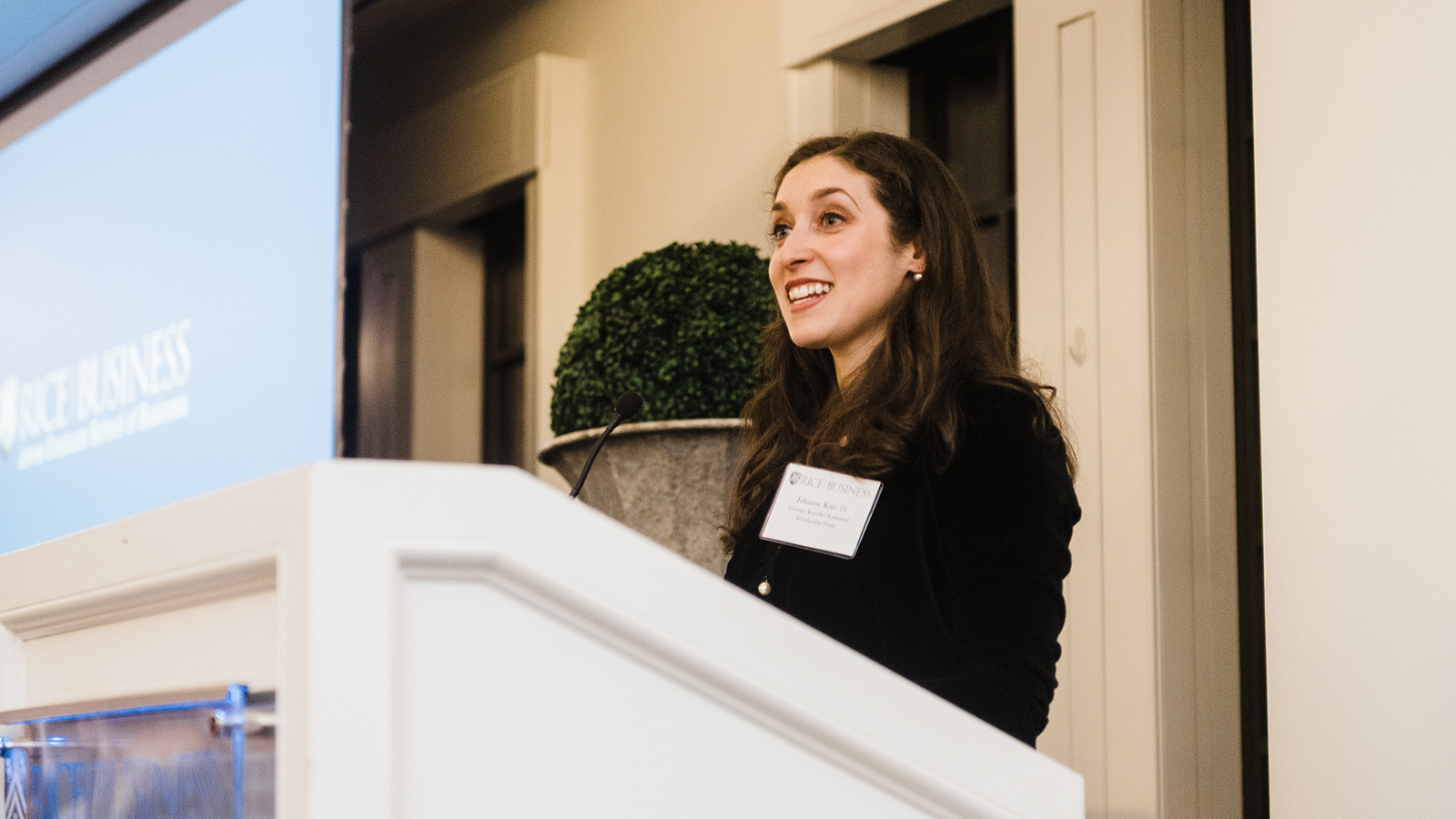
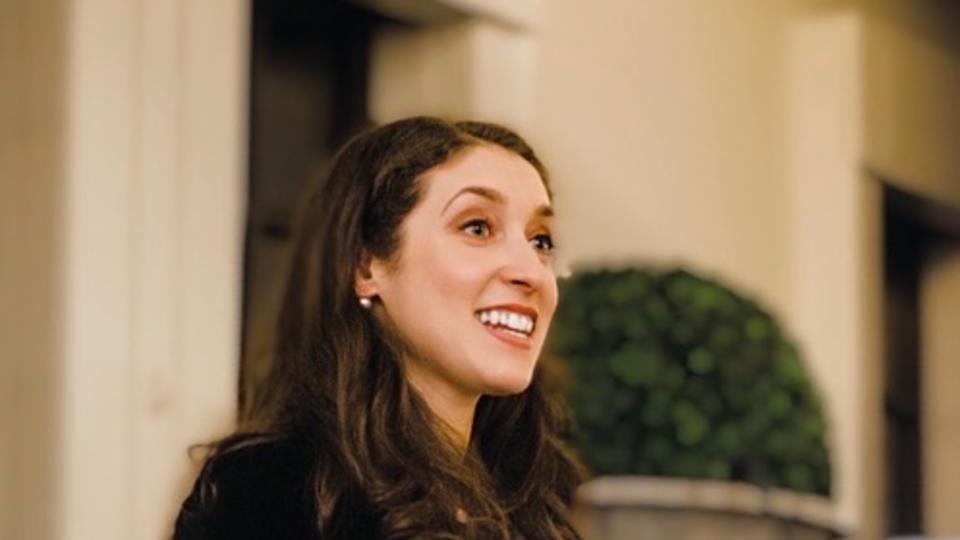

At Rice Business, our clubs, organizations and conferences give students the opportunity to cultivate their leadership and business skills and to network with experts in different industries. Julianne Katz was president of the 21st annual Women In Leadership Conference, Authentic Voices: Defining and Expressing Your True Identity, and this was her experience.
Why did you choose Rice?
Initially, it was my very generous scholarship opportunity that opened my eyes up to Rice. But the real decision maker was the community. In my two visits to campus for Rice Business Admit Weekends, I already felt that I had built lifelong relationships with my future classmates. I also felt like the faculty and staff really believed in my potential and would support me. Other “pros” that influenced my decision were the small class size, the opportunity to network in the large and vibrant city of Houston, and the strong Entrepreneurship program, to name a few.
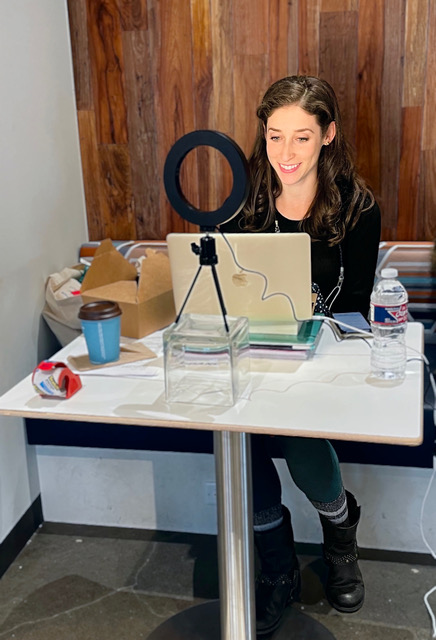
What did you learn while running your respective conference/competition?
Running the Women in Leadership Conference (WILC) during the peak of Covid-19 was an exercise in innovation. We had the opportunity, and the support from Rice, to make bold changes to the usual format and line-up.
The greatest takeaways for me were: (1) trust your gut when taking chances on new ideas, (2) surround yourself with a passionate and capable team who you know you can count on, (3) lead with joy, and the rest will follow.
Where did you start your career and where are you now?
I began my career as a theater performer (my first job was performing a principal role on a Broadway National Tour), and then as a Director/Choreographer. I had countless side-hustles, which ultimately led me to co-found an arts education company called Broadway Kids Auditions (BKA) in New York City. Running my business for six years sparked a new desire in me… fast forward to the MBA. I am excited to start my new chapter, post-MBA, with Zx Ventures, the innovation/new venture arm of beverage giant, ABInBev.
What advice do you have for prospective students?
I believe that success during your MBA experience is dependent on making choices that work for you. Say yes to things. But also learn how to say no. You cannot do everything, you cannot be everything. Listen to your intuition when navigating your journey, and give 100% to the opportunities that you do accept.
…and ENJOY! It goes quickly!
Julianne Katz was a Full-Time MBA student in the Class of 2021. She was the President of the 2021 Women in Leadership Conference.
The Rice MBA
The Surprising Upside of Gray Markets
Long seen as a threat to profits, gray market sales are disrupting conventional wisdom. Under the right conditions, unauthorized channels can actually drive innovation, quality and higher returns.


Based on research by Amit Pazgal
Key findings:
- More and more consumers are gravitating to gray markets, where genuine products are sold through unauthorized channels.
- Gray markets typically have a bad reputation since they often deprive manufacturers and retailers of profits.
- But research by Amit Pazgal finds that in certain situations, gray markets can actually help manufacturers and retailers.
A camera store in Taiwan buys Nikon cameras from an electronics shop in the Philippines, where photo equipment is cheaper. Then the store sells them to consumers in Taiwan at a lower price. The camera comes without a warranty and instructions are in Filipino – the buyers in Taiwan are happy to have a real Nikon for a lower cost.
The sellers and customers are operating in the so-called gray market – where genuine products are sold through unauthorized channels. Gray marketers buy goods in markets with lower prices, then ship them to a market with higher prices, where they will likely sell for a profit. Though the products are identical, consumers typically see gray market goods as inferior since they often lack benefits like after-sale services or warranty coverage.
For years, gray markets have posed a significant threat to both manufacturers and retailers, depriving both of customers and profits. It’s estimated that around $7 billion to $10 billion in goods enter the U.S. market through gray market channels every year. The IT industry, for one, loses approximately $5 billion a year due to gray market activities.
No specific laws in the U.S. ban this practice outright, however. As a result, in recent years, retailers are increasingly taking advantage of potentially cheaper prices abroad, personally importing or using third parties to buy original goods not meant for direct sale in the United States – and then selling them here for less. Alibaba, China’s most extensive online shopping site, offers its hundreds of millions of shoppers a large array of gray market goods to peruse.
Manufacturers usually respond to gray markets with knee-jerk hostility, urging customers to avoid gray market goods and even filing lawsuits against gray market peddlers. Nikon, for example, includes a website section to educate consumers on how to identify gray market products, to shun the gray market.
But is gray market commerce always destructive? Rice Business Professor Amit Pazgal joined then-Rice Business Ph.D. student Xueying Liu (now an assistant professor at Nankai University) to explore scenarios in which gray markets could be good for both manufacturers and retailers. Testing the theory in recent research, Pazgal and Liu found that there are indeed situations in which both manufacturers and retailers can profit thanks to gray markets, while the associated product also improves in quality.
To reach these conclusions, the researchers started by recruiting 118 participants between the ages of 25 and 45 to complete a gray market product survey. They found the majority had no problem buying gray market goods. Only 3% of consumers wouldn’t consider buying cosmetics from a gray marketer, while 6-7% wouldn’t buy electronics. Despite this, more than 90% of participants who were willing to buy required a price discount of 20-30%, showing the goods were seen as slightly inferior.
The researchers then tested responses to a model of a manufacturer selling a single product to two markets – or countries – that differed in size and in customer willingness to pay for the product. Consumers in one market would pay more, on average, for quality. For example, the Nikon D500 camera is sold for a 7.5% premium in Taiwan versus Thailand and a 10% price premium in Taiwan versus the Philippines.
Pazgal and Liu found that when the manufacturer sells their product directly to consumers in both markets when there is also a gray market, both the manufacturer’s profit and product quality decrease. But when the same manufacturer sells their product indirectly to a retailer in at least one of these markets, both the manufacturer’s and the retailer’s profits can increase. So can the product’s quality.
This occurs for several reasons. First, gray marketers increase total demand and profit for the retailer in the lower-priced market, or in the market where the gray marketer buys their goods. The manufacturer can set a higher wholesale price for the better quality product in a market where consumers pay more, and increase sales in both markets as consumers compare the regular, high-quality product to the gray market one. In fact, by offering a lower-priced, lower quality (that is, gray market) alternative to its own high-quality product, the manufacturer can better segment consumers in the higher-priced market.
Finally, the retailer in the higher-priced market becomes more profitable even though they lose some customers to the gray market. This is because increased product quality and price more than make up for lost sales. Researchers found that the results hold regardless of whether the gray marketer buys from the manufacturer or a retailer.
The bottom line: in certain situations, gray markets can improve profitability for both manufacturers and retailers (and, of course, the gray marketers). Counterintuitive though it is, manufacturers that sell through retailers shouldn’t automatically see gray markets as an obstacle to their profits, rushing to demand that governments and courts shut them down. Instead, in some cases, companies could do well to embrace these gray markets, because they lead to overall improved profits.
Manufacturers can use this information to their advantage, Pazgal noted. Nikon, for example, could introduce a higher quality camera to the market, allowing it to set even higher wholesale prices and increase sales in both markets, far exceeding the cost of the higher quality product.
For consumers, meanwhile, gray markets are always beneficial because of lower prices. If companies heed Pazgal’s findings, however, customers could also benefit from more innovative and higher quality cameras and other merchandise, as manufacturers hurry to create better products to bump up their profits.
Liu & Pazgal. “The Impact of Gray Markets on Product Quality and Profitability.” Customer Needs and Solutions 7.3 (2020): 62–73. https://doi.org/10.1007/s40547-020-00105-6.
Operations Management Area Coordinator
Never Miss A Story





